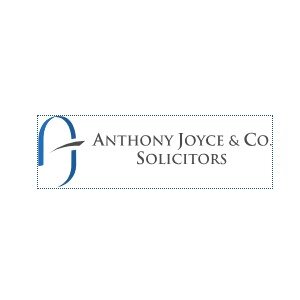Best Bankruptcy Lawyers in Ireland
Share your needs with us, get contacted by law firms.
Free. Takes 2 min.
Or refine your search by selecting a city:
List of the best lawyers in Ireland
About Bankruptcy Law in Ireland
Bankruptcy in Ireland is a legal process that allows individuals or entities who are unable to repay their debts to have those debts legally discharged. The process is designed to ensure that creditors receive a fair distribution of the debtor’s available assets. Bankruptcy in Ireland is governed by the Bankruptcy Act 1988, as well as various amendments over the years including the Personal Insolvency Act 2012.
Declaring bankruptcy typically involves the sale of the debtor’s assets by the Official Assignee in Bankruptcy. The goal is to distribute the proceeds among creditors and ultimately provide the debtor with a fresh start once the bankruptcy period is concluded, which generally lasts one year under current legislation.
Why You May Need a Lawyer
There are several situations where you may require professional legal advice when dealing with bankruptcy:
- Considering bankruptcy as an option: Understanding whether bankruptcy is the right move requires a thorough analysis of your financial situation, which a lawyer can assist with.
- Filing for bankruptcy: The process involves several legal documents and court proceedings that require careful management and understanding.
- Dealing with creditors: A lawyer can negotiate with creditors on your behalf and handle any disputes that may arise during the bankruptcy process.
- Navigating complex cases: If your financial situation involves multiple jurisdictions, significant assets, or complex debt structures, legal expertise is essential to guiding the process.
- Compliance and rights protection: Ensuring compliance with bankruptcy laws and protecting your rights throughout the process is crucial, and a lawyer can provide this assurance.
Local Laws Overview
Key aspects of the bankruptcy laws in Ireland include:
- Threshold: To declare bankruptcy, the debtor must owe at least €20,000 in unsecured debt.
- Official Assignee: The Official Assignee in Bankruptcy is responsible for administering the estate of the bankrupt individual.
- Duration: Under the current rules, bankruptcy typically lasts one year, after which the individual is discharged.
- Income Payment Orders: Debtors may be required to make payments towards their debts for up to three years after discharge if they have a surplus income.
- Asset Realisation: The sale of non-essential assets is conducted to repay creditors, but there are some protections such as retention of essential living items.
- Restrictions: Certain restrictions apply during bankruptcy, such as the inability to serve as a company director.
Frequently Asked Questions
What is the minimum debt required to declare bankruptcy in Ireland?
The minimum amount of unsecured debt required to declare bankruptcy in Ireland is €20,000.
How long does bankruptcy last in Ireland?
Bankruptcy usually lasts for one year in Ireland, after which the debtor is discharged from most debts.
Do I lose all my assets in bankruptcy?
Non-essential assets may be sold to repay creditors, but there are protections in place for essential items needed for basic living.
Can I keep my home if I declare bankruptcy?
Your home may be sold if it is considered an asset that can be used to repay debts. However, each case is unique, and a lawyer can provide specific advice.
What happens to my debts after I am discharged from bankruptcy?
Most debts are discharged at the end of the bankruptcy period, releasing you from the obligation to repay them. Some debts, like certain court fines or family maintenance debts, are not discharged.
Can I be forced into bankruptcy by my creditors?
Yes, creditors can apply to the court to have you declared bankrupt if you owe them €20,000 or more in unsecured debt and you are unable to repay.
Are all debts included in bankruptcy?
Most unsecured debts are included; however, secured debts like mortgages and certain other debts such as spousal or child maintenance obligations are not discharged in bankruptcy.
Is my income affected during bankruptcy?
Your surplus income can be subject to an Income Payment Order for up to three years, requiring you to make payments to your creditors if you have disposable income.
What role does the Official Assignee play in bankruptcy?
The Official Assignee is responsible for managing the bankruptcy process, including the sale of assets and distribution of proceeds to creditors.
Can I start a business while bankrupt?
While you are not prohibited from running a business, you are banned from being a company director during the bankruptcy period.
Additional Resources
If you need further information or assistance regarding bankruptcy in Ireland, consider the following resources:
- Insolvency Service of Ireland (ISI): Provides comprehensive information and guidance on bankruptcy and insolvency solutions.
- Citizens Information: Offers detailed advice and factsheets on bankruptcy laws and processes in Ireland.
- Legal Aid Board: May offer assistance in accessing legal advice for individuals experiencing financial difficulties.
- MABS (Money Advice and Budgeting Service): Offers free budgeting and advice services for those struggling with debt.
Next Steps
If you find yourself needing legal assistance with bankruptcy in Ireland, consider the following steps:
- Evaluate your financial situation and consider whether bankruptcy is the most suitable option.
- Consult with a professional bankruptcy lawyer to understand your rights and obligations.
- Gather all necessary financial documents, including records of income, debt, and assets, to provide to your lawyer or advisor.
- Contact the Insolvency Service of Ireland or a local financial advisor for additional support and guidance.
- Prepare for the bankruptcy process by understanding potential asset sales, court hearings, and compliance requirements.
Lawzana helps you find the best lawyers and law firms in Ireland through a curated and pre-screened list of qualified legal professionals. Our platform offers rankings and detailed profiles of attorneys and law firms, allowing you to compare based on practice areas, including Bankruptcy, experience, and client feedback.
Each profile includes a description of the firm's areas of practice, client reviews, team members and partners, year of establishment, spoken languages, office locations, contact information, social media presence, and any published articles or resources. Most firms on our platform speak English and are experienced in both local and international legal matters.
Get a quote from top-rated law firms in Ireland — quickly, securely, and without unnecessary hassle.
Disclaimer:
The information provided on this page is for general informational purposes only and does not constitute legal advice. While we strive to ensure the accuracy and relevance of the content, legal information may change over time, and interpretations of the law can vary. You should always consult with a qualified legal professional for advice specific to your situation.
We disclaim all liability for actions taken or not taken based on the content of this page. If you believe any information is incorrect or outdated, please contact us, and we will review and update it where appropriate.
Browse bankruptcy law firms by city in Ireland
Refine your search by selecting a city.















